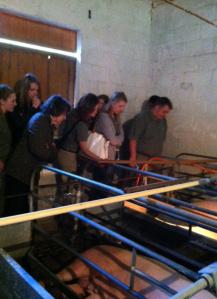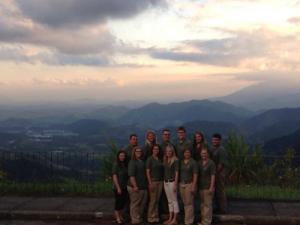By Laura Gorecki, University of Nebraska, Lincoln and Jenna Vculek, North Dakota State University
Today was all about the smells of agriculture, from roses to pigs. We started off another amazing day in Brazil after departing our hotel in Barbacena and headed to the award winning Sao Sebastiao flower nursery.
We were greeted by the general manager who started off our tour by showing us the various greenhouses used in rose production. Sao Sebastiao was established 15 years ago and is a seven hectare, family owned, operation. They run 22 greenhouses to cultivate their high quality roses.
After exploring greenhouses we saw the warehouse where they package flowers for transportation and do flower arrangements. We also got to look inside one of their large storage coolers full of roses of various varieties.
We learned that the length of the stem rather than the quality of the flower determines the worth of a rose. In 2011 Sao Sebastiao didn’t export any flowers, but they have exported to Portugal in the past. We learned that the mark up on roses in Brazil is three or four times the whole sale price.
Before lunch, we stopped at a farrow to finish swine operation. We felt very honored to be the first group to tour their operation for the 15 years it has been in business. Hog operations in Brazil don’t like to host visitors because Brazil has never had a case of Porcine Respiratory and Reproductive Syndrome or PRRS. The operation farrows out over 500 sows and feeds the pigs until they reach market weight. They use artificial insemination and a set of vaccinations to keep the pigs healthy. We were surprised at how organized the operation was from birth until market. As we have noticed with all of the farms we visited, the facilities were very clean and well-kept.
The management practices used in this business was very similar to those in the U.S. Each sector of the operation was managed by an individual trained specifically for that area. The safety and care of the pigs was stressed in order to reduce illness and stress on the pigs. It was very interesting to view the similarities between the practices used at home and at this operation.
We stopped for a late lunch at a German café in Petropolis. The group was very excited to head to Rio de Janeiro for the last leg of our journey. This evening we enjoyed supper and a Samba show in Rio de Janeiro. We are happy to be in Rio where the roads are a little straighter and there are fewer speed bumps.



